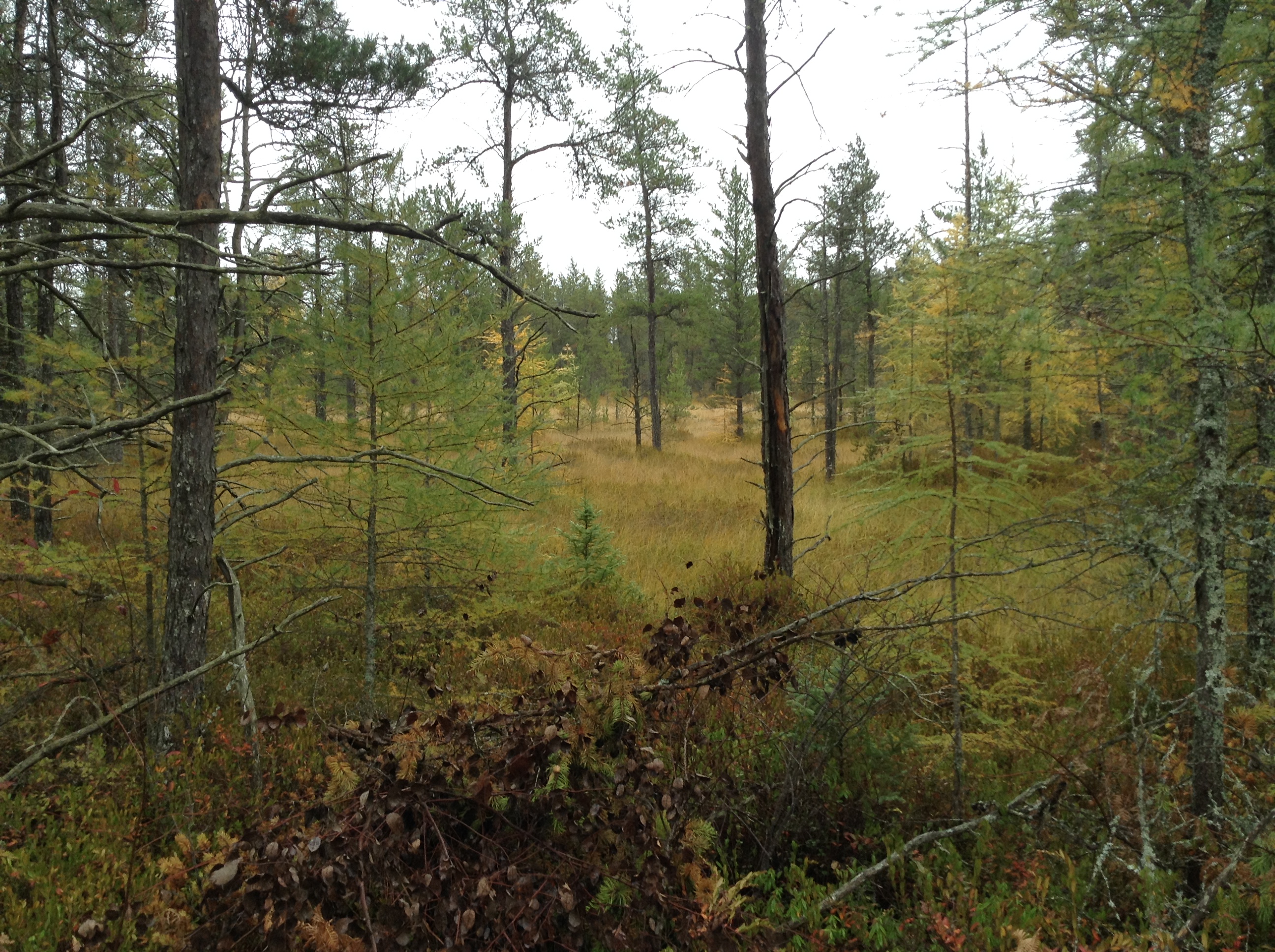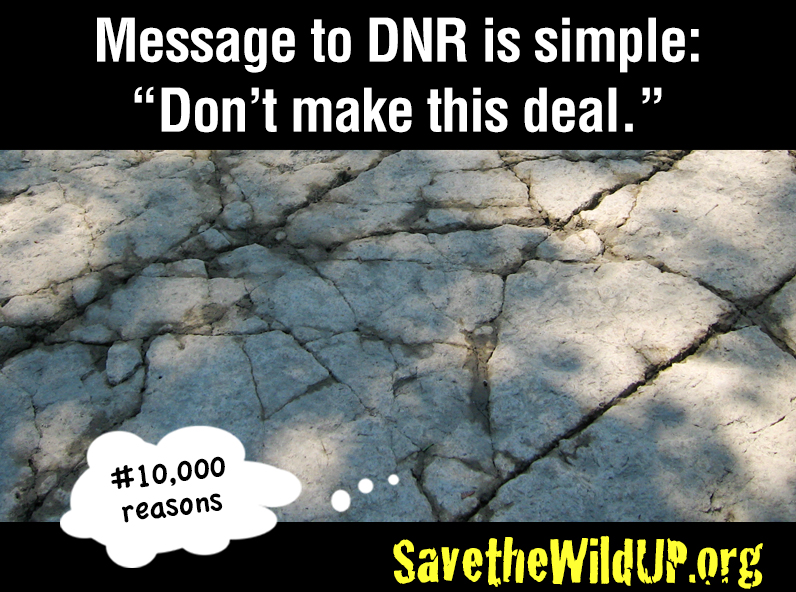FOR IMMEDIATE RELEASE
Unified Opposition to Graymont ‘Land Transaction’
MARQUETTE — Environmental groups from across the Upper Peninsula are holding fast in their opposition to the recent sale of state land and mineral rights to the Canadian limestone mining company, Graymont, Inc.
“This is a huge loss for Michigan taxpayers and a massive blow to federally promised treaty rights,” said Alexandra Maxwell, Save the Wild U.P.’s interim director. “The DNR’s unilateral decision shows clear disregard for the input of Michigan citizens.”
Director Keith Creagh of the Michigan Department of Natural Resources (DNR) announced his final approval of the Graymont Land Transaction in Roscommon, MI at a meeting of the Natural Resources Committee on Thursday, March 20. While not a mining permit per se, the DNR’s decision effectively converts roughly 10,000 acres of diverse, high-quality public lands into a sprawling complex of open pit limestone quarries and extensive underground mining operations.
“We are angry!” said Horst Schmidt, F.O.L.K. board member. “Again and again, the DNR said ‘send in your comments,’ but in a March, 2015 memo, Creagh’s managers blew off all comments as irrelevant. Yet in a press release issued after Creagh approved the transaction, their public relations person says the exact opposite! Over 90% of the comments, according to the first memo, were against the sale. How many citizens does it take to stop one corporation?”
Unprecedented in scale, the land transaction includes direct sale of approximately 1,781 acres of state-owned land plus 7,026 acres of state mineral rights to Graymont, a land exchange whereby Graymont acquires 830 acres of state-owned land, and a 10-year option secured by Graymont to acquire an easement over an additional maximum of 55 acres. Graymont Mining submitted the final revision of their application less than two weeks prior to the decision—the latest in an ever-changing application. DNR protocol dictates a thirty day public comment period once any revisions are received; this time however, no such public comment period was allowed.
The state lands that Creagh decided to trade, sell or transfer to Graymont include areas of shallow soil over limestone. They may include alvar, a globally-rare community found only in three regions of the world, including the upper Great Lakes region of eastern Upper Michigan and nearby Ontario, which often support unique plant communities and rare plant and insect species. The diverse wetlands slated to be handed over to Graymont may also harbor rare plants. Documents posted on the DNR’s “Graymont Land Transaction” page include no mention of biological or rare species assessments being done in preparation for this land transfer.
In late February, a collective letter of opposition was sent to Director Creagh, outlining serious concerns with the proposed transaction, including displacement of existing limestone quarrying jobs and the loss of sustainable, long-term jobs in the forestry and tourism sectors, and noting that the sale of these lands would interfere with tribal rights by having an adverse impact on fishing, hunting and gathering activities of tribal members under the 1836 treaty.
The letter of opposition was jointly signed by individual citizens as well as major groups, including the Michigan League of Conservation Voters, Upper Peninsula Environmental Coalition, Friends of the Land of Keweenaw’s (F.O.L.K.) Board of Directors, the Chippewa Ottawa Resource Authority, the Central U.P. Group of the Michigan Chapter of the Sierra Club, Yellow Dog Watershed Preserve, Concerned Citizens of Big Bay, Save the Wild U.P., the Sault Ste. Marie Tribe of Chippewa Indians, the Keweenaw Bay Indian Community, Students for Sustainability of Northern Michigan University, Northwoods Native Plant Society, Citizens for Alternatives to Chemical Contamination, Citizens Against the Rexton Project, Concerned Clergy of Marquette, the Marquette Unitarian Universalists Social Action Committee and multiple individual property owners in Trout Lake, MI.
“The DNR hopes we’ll believe they’ve addressed all objections raised during the public comment period, but that’s obviously not true. Most of our concerns were ignored. The approval of this sale directly contradicts the DNR’s own mission of conservation, protection, and public enjoyment of public natural resources,“ said Maxwell.
“We are extremely disappointed!” said local Trout Lake resident Kathy English. “This is total disenfranchisement for the people living in the area, who will be adversely affected by this decision. It is a significant and decisive blow to the threatened and endangered plants and wildlife, unique geology, recreation and tourism. It makes the “PURE MICHIGAN” slogan a joke.“
After the decision was announced, Dr. Martin Reinhardt, an assistant professor of Native American Studies at Northern Michigan University, and enrolled citizen of the Sault Ste. Marie Tribe of Chippewa Indians, along with Dr. Phil Bellfy, professor emeritus of American Indian Studies at Michigan State University and citizen of the White Earth Nation, filed an injunction against DNR Director Creagh citing violations of the 1836 Treaty of Washington between the U.S. federal government and the Ojibway Nations. While the injunction was dismissed, the judge acknowledged unresolved provisions related to the Consent Decree and tribally-held fishing rights.
“This decision to allow Graymont to open a mine near Rexton was highly irresponsible on the part of Director Creagh and the NRC,” said Reinhardt. “It really exemplifies how the State of Michigan is mismanaging public lands in violation of Anishinaabe treaty rights and human rights in general. You can get short term economic gains through these types of actions, but it will have severe repercussions for future generations. Our Anishinaabe ancestors warned us about this path of destruction, and it is up to us to stop it before it is too late.”

Graymont proposal area

Founded in 1989, FOLK is an active all-volunteer organization located in the western Upper Peninsula of Michigan. It works with other regional, state and national organizations to protect and preserve the ecological integrity of the Lake Superior Watershed. See their website, folkup.org, or follow FOLK on Facebook at facebook.com/folkorg.
Founded in 2004, Save the Wild U.P. is a grassroots environmental organization dedicated to preserving the Upper Peninsula of Michigan’s unique cultural and environmental resources. For more info about their work, see savethewildup.org, or follow on Facebook facebook.com/savethewildup.
###
Thank you for engaging in this fight against the DNR’s sale of public land. The UP is under assault from mining companies trying to exploit the natural resources of the land at the expense of all the beauty that is Northern Michigan. Once it is gone it is gone forever.
I have just moved to Negaunee , I for one don’t find it at all good for any of us to keep raping the land . We need to have safe places to get water and grow food . The things that happen around these sights is unthinkable . Please don’t sell or lease any more of our lands ,yes they are mine and yours ! THANK-YOU Karen
This is just another example of this state ignoring the will of the people. Snyder set the tone by ignoring the will of the people with his emergency manager law!
We need an attorney. The DNR is allowed to sell surplus lands only. According to their own staff this is prime timber and prime habitat. So the DNR is pushing forward with a sale they are not legally allowed to make.
Wake up State of Michigan! Stop the disaster of ruining our State land. It’s not all yours to do with what you please. Once it’s gone- it’s gone for good. REALLY!!!